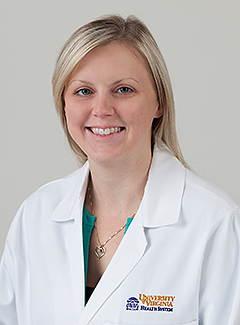
Emily S Moses, MD
Pediatric Hematology Oncology
Additional Locations
Bio & Overview
Emily Moses, MD, is a pediatric hematologist-oncologist who specializes in caring for children with brain tumors. She is also the medical director of the comprehensive sickle cell disease clinic at UVA Children’s.
A lifelong Wahoo, Dr. Moses grew up in Hampton, Va., and received her undergraduate degree from UVA. She attended medical school at Drexel University College of Medicine in Philadelphia, Pa., and went on to complete her residency and fellowship training at the University of Texas Health Science Center at San Antonio.
Dr. Moses is married to fellow UVA physician, Dr. Benjamin Moses. They have two children who keep them busy outside of the hospital, chauffeuring to dance, music lessons and gymnastics.
Academic Information
- Department
- Pediatrics
- Academic Role
- Assistant Professor
- Division
- Pediatric Hematology/Oncology
- Gender
- Female
- Languages
- English
- Age Groups Seen
- Infants (0-2)
Children (2-12)
Adolescents (12-21)
- Primary Education
- Drexel University College of Medicine
- Residency
- University of Texas Health Science Center at San Antonio
- Fellowships
- University of Texas Health Science Center at San Antonio
- Certification
- American Board of Pediatrics (Pediatric Hematology-Oncology), American Board of Pediatrics (Pediatrics)
Highlights
Meet Pediatric Hematologist Oncologist Emily Moses, MD
My name is Emily Moses, and I'm a pediatric hematologist oncologist. So I take care of children with all types of cancer and blood disorders. My area of focus is on patients with brain tumors and with a blood disorder called sickle cell disease. When I was 17, my younger sister was diagnosed with a brain tumor, and that's when I decided that I wanted to pursue a career in medicine. The most important thing specifically about pediatric hematology oncology is it's such a teamwork approach and multidisciplinary approach. So it's so important for us to show the patient and the family that they're not alone, and that we have so many resources and we're there to help them through this time in their life. I think it is so important to be able to provide care for patients who have been underserved or underfunded so that we can have better treatments for those patients and they can live long and full lives.